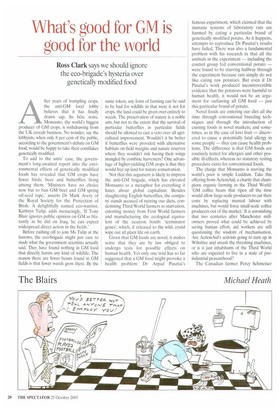What's good for GM is good for the world
Ross Clark says we should ignore the eco-brigade's hysteria over genetically modified food
After years of trampling crops, the anti-GM food lobby believes that it has finally drawn sap. Its bete noire, Monsanto, the world's biggest producer of GM crops, is withdrawing from the UK cereals business. No wonder, say the lobbyists, when only 8 per cent of the public, according to the government's debate on GM food, would be happy to take their cornflakes genetically modified.
To add to the antis' case, the government's long-awaited report into the environmental effects of genetically modified foods has revealed that GM crops have fewer birds, bees and butterflies living among them. 'Ministers have no choice now but to ban GM beet and GM spring oil-seed rape.' asserts Dr Mark Avery of the Royal Society for the Protection of Birds. A delightfully named eco-warrior. Kathryn Tulip, adds menacingly, 'If Tony Blair ignores public opinion on GM as blatantly as he did on Iraq, he can expect widespread direct action in the fields.'
Before rushing off to join Ms Tulip at the furrows, the eco-brigade might just care to study what the government scientists actually said. They have found nothing in GM food that directly harms any kind of wildlife. The reason there are fewer beasts found in GM fields is that fewer weeds grow there. By the same token, any form of farming can be said to be bad for wildlife in that were it not for crops, the land could be given over entirely to weeds. The preservation of nature is a noble aim, but not to the extent that the survival of particular butterflies in particular fields should be allowed to cast a veto over all agricultural improvement. Wouldn't it be better if butterflies were provided with alternative habitats on field margins and nature reserves where they wouldn't risk having their wings mangled by combine harvesters? One advantage of higher-yielding GM crops is that they would free up land for nature conservation.
Not that this argument is likely to impress the anti-GM brigade, which has elevated Monsanto to a metaphor for everything it hates about global capitalism. Besides slaughtering English butterflies, the company stands accused of ruining our diets, condemning Third World farmers to starvation, extorting money from First World farmers and manufacturing the ecological equivalent of the neutron bomb: 'terminator genes', which, if released to the wild, could wipe out all plant life on earth.
Given that GM foods are novel, it makes sense that they are by law obliged to undergo tests for possible effects on human health. Yet only one trial has so far suggested that a GM food might provoke a health problem: Dr Arpad Pusztai's famous experiment, which claimed that the immune systems of laboratory rats are harmed by eating a particular brand of genetically modified potato. As it happens, attempts to reproduce Dr Pusztai's results have failed. There was also a fundamental problem with his research in that all the animals in the experiment — including the control group fed conventional potato — were found to be starving halfway through the experiment because rats simply do not like eating raw potatoes. But even if Dr Pusztai's work produced incontrovertible evidence that the potatoes were harmful to human health, it would not be an argument for outlawing all GM food — just this particular brand of potato.
Novel foods are entering our diet all the time through conventional breeding techniques and through the introduction of existing foods in novel markets; and sometimes, as in the case of kiwi fruit — discovered to cause a potentially fatal allergy in some people — they can cause health problems. The difference is that GM foods are routinely tested for allergies and other possible ill-effects, whereas no statutory testing procedure exists for conventional foods.
The charge that Monsanto is starving the world's poor is simple Luddism. Take this offering from ActionAid, a charity that champions organic farming in the Third World: 'GM coffee beans that ripen all the time would allow large-scale producers to cut their costs by replacing manual labour with machines, but would force small-scale coffee producers out of the market.' It is astonishing that two centuries after Manchester millowners proved what could be achieved by saving human effort, aid workers are still questioning the wisdom of mechanisation. Are ActionAid's activists going to turn up in Wiltshire and smash the threshing machines, or is it just inhabitants of the Third World who are expected to live in a state of preindustrial peasanthood?
The Canadian farmer Percy Schmeiser has become something of a pin-up for the anti-GM lobby. In 2000 he was taken to court by Monsanto for infringement of its patents after detectives working for the company discovered GM canola (rapeseed) growing in his fields. Mr Schmeiser denies growing the crop without a licence, saying that he always grew his canola by saving seed from his previous harvest. If there was GM canola in his crop, he says, it must have got there by wind pollination. Thanks to Mr Schmeiser's webs ite, which presents his case as a 'Classic David v. Goliath struggle', farmers the world over are now babbling about dark plots by Monsanto to drive around farmsteads, sowing GM seed from open-topped lorries in order to supplant all other varieties of rape-seed with its own.
Mr Schmeiser, however, lost his case in the Canadian courts (the results of an appeal to the Supreme Court are still awaited) after it was revealed that the crop growing in his fields was made up of between 95 and 98 per cent GM canola: a far greater proportion than could be explained by wind pollination. Far from seeking to contaminate other farmers' crops, Monsanto was found to be active in preventing its spread: two other independent farmers in the area testified that they had complained about contamination from GM crops and that Monsanto had swiftly sent teams to remove the offending plants.
Cases like Mr Schmeiser's may not be repeated because many future GM crops will have 'terminator' genes — they will be engineered in such a way as to make it impossible to grow them from their own seed, This technology has the ability to put an end to contamination issues for good, though of course it does not please the anti-GM lobby. The lobby argues that the terminator genes could jump to other species, thus preventing plant reproduction and wiping out all plant life on earth. This is nonsense: if plants produce sterile seeds, they cannot share their genes with any other form of plantlife. Theories about `superw-eeds' belong, too, to science fiction: even GM plants without terminator genes can only crossbreed with close relatives, making it impossible for GM turnips to 'jump' to the thistles in your garden.
The tragedy of the scaremongering that passes for debate on GM foods is that it overlooks the genuine questions, most of which are competition issues. Clearly, it is unsatisfactory that one company is so dominant in the development of GM crops. Monsanto could easily be prevented from building a monopoly in the technology were more companies to be tempted into it. The trouble is, given the vilification that has been heaped on Monsanto, which company would want to join the fray? The bigboots of the anti-GM brigade aren't just trampling on Monsanto as they take to the rape fields; they are trampling on the competition. too.



































































































 Previous page
Previous page